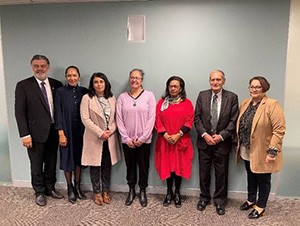Together, we will build our future health system#
Stephen McKernan
Director – Transition Unit (TU)
Kia ora koutou
I was pleased to be able to share with you in last month's Update the news that we had reached a milestone of hosting and attending more than 100 meetings. We have engaged with Māori, sector groups, government agencies and more, with many of those groups listed here. Since then, our commitment towards broad engagement has not slowed, and we expect to both host and attend a significant number of further hui, conferences, meetings and virtual sessions as we continue to progress our transformation programme.
As you know, we have a bold and very large work programme ahead. Our ongoing focus on engagement helps us listen, and to gather information and feedback from a wide range of people and groups. This will help us progress the reforms in a way that will meet New Zealand's future healthcare needs.
Our future health system is based on putting people at the very centre – we need to create a system to support all New Zealanders to live longer and have the very best quality of life.
We can only achieve that by listening, partnering and collaborating – something we are committed to doing and doing well. I know there is a great deal more work to do, with our first milestone fast approaching, the announcement of the interim Māori Health Authority and Health NZ Boards in September.
I do want to acknowledge the significant pressure the health system is currently facing. As well as progressing the reform transformation, there are many other priorities to balance. People are the tūranga/foundation of the system – highly skilled, dedicated and professional individuals who are working incredibly hard in an environment that has many challenges.
Over the next few months, I'm looking forward to visiting a number of parts of the sector and meeting with many more people working in the sector to listen, answer questions and share the progress of the reform. More details on these visits will follow soon.
The change we have ahead is significant, and I'm positive that as we work our way through it, the benefits that Aotearoa New Zealand will get from the key system shifts will be worth the hard work. Together, we can design and deliver a system that will be better for all New Zealanders.
Māori shaping our future health system#

The Māori team and others in the Transition Unit has been engaging up and down the motu, working with Iwi Māori Partnership Boards, Iwi representatives, Māori leadership and staff from DHBs, Māori providers and their partners, wider Māori stakeholders and whānau. The korero generally indicates a great deal of support for the reforms, including the proposed new entities, their functions and relationships.
Many have expressed optimism about how the new arrangements might better deliver for whānau and communities, and how rangatiratanga might be reflected in the new system – with iwi and Māori leading and shaping the way that services are prioritised, designed and delivered to support Māori needs and aspirations. Whānau will have very high expectations for the Māori Health Authority, given the attention on its unique Māori nature and focus, but this should hold equally true for their expectations of Health NZ and all other health sector entities. The feedback has been clear – the entire system needs to listen and respond better. The ability to connect closely at community level will be vital to this.
A key piece of work in the last month has been progressing thinking on the role, functions and make-up of Iwi Māori Partnership Boards (IMPBs). The rich discussions and feedback reflect keen interest in the strengthened role of IMPBs, alignment to traditional rohe, and how they may be supported to carry out their functions and responsibilities as Tiriti partners. There is more to work through, including IMPB membership, accountabilities back to Māori communities, and resourcing to support IMPBs to progress these matters over the coming months, ahead of formalising new relationships with Health NZ and the Māori Health Authority come 1 July next year.
More than 150 applications were received for the interim Māori Health Authority Board. Tā Mason Durie, who was appointed to lead a Steering Group to establish and oversee the selection process, was impressed with the calibre of applications. A preferred list of candidates has now been created and is with Minster Little and Minister Henare for consideration.
"This level of interest, from a wide range of highly skilled and experienced Māori who offer a strong Tiriti and Health equity lens from right across Aotearoa, shows very clearly how serious Māori are about making the Māori Health Authority work," says Tā Mason.
As well as the Board selection process, the Steering Group is also looking at how the future health system is accountable to Māori, including how an entity such as the Māori Health Authority might have its 'mission' shaped by Māori and be responsive to Māori, in particular to whānau. The Steering Group has looked at accountability models adopted by other national organisations, Māori and non-Māori, as well as international models from the United States, Canada and Australia. They are clear that any such arrangements need to consider and be focused on Māori health realities, capabilities, innovation and aspirations.
"Our health and disability system has underperformed for Māori for far too long. The differences in life expectancy, in mortality rates, in morbidity, in access, in treatment, in responsiveness are simply terrible. So much of this difference is avoidable. I am hugely encouraged by the progress we are making towards designing a system that will place greater emphasis on achieving better health outcomes for Māori and our entire population," says Chad Paraone, Māori Lead, Transition Unit.
"The Māori Health Authority will be a game-changer, as will empowered IMPBs, and enabling the Māori health sector to play a greater role in leading system and service change for Māori whānau will 'up the ante' further. Health NZ will also be keenly focused on this space. Exciting times! I look forward to keeping you updated as we continue this journey," says Chad.
New roles to ensure our health system has people and whānau at its heart#
Consumer voice#
Our vision is to deliver a people-and whānau-centred health system based on input of the voices of all New Zealanders. To make this happen, people and whānau must have a meaningful say in the design and delivery of health services, even if they don't need to access them right away.
We do have some national mechanisms in place to capture the voices of those who use the current health system, but they are highly variable across the country, largely under-resourced, and do not reliably prioritise the views of everybody.
We know that one size does not fit all – every engagement needs to be designed to meet the needs of each person or group. In our future health system, there will be an opportunity to embed the voices of people who use health services more deliberately and consistently by building a more consistent and people-focused national framework that makes it easier for diverse voices across the entire health system to provide their feedback.
Claire Braatvedt, lead advisor of the consumer voice project in the Transition Unit, says it is important that people's voices are embedded as a key component of the new system as early as possible so both the design and implementation is people and whānau centred.
"It's great news then that we have recently signed up to a joint work programme, called Partners in Care, with the Health Quality & Safety Commission to deliver the foundational elements of a consumer voice framework over the next 12 months," says Claire.
The Partners in Care programme team at the Commission will focus on building partnership and leadership between providers and consumers at all levels of health and disability services – for individuals, specific population groups and the wider system. Dr Chris Walsh, director of the programme and Deon York, assistant director, say this joint work with the Transition Unit is an opportunity to build and extend the networks and resources developed and build national consistency.
The Partners in Care programme team will see us working together with consumers, whānau, and the health sector to deliver:
- A national set of expectations for how consumer voices are gathered and used across the system which will clarify expectations and strengthen accountability
- A national consumer forum (and supporting database) that works as an umbrella body for consumer groups to support the health system to access to the right consumer groups, at the right level, in the right way
- A centre of excellence for consumer voices that supports consumer voice leaders across the system with information and training on best practice for consumer and whānau engagement.
We are recruiting staff, to be based at the Health Quality & Safety Commission, who will support the Partners in Care programme. You can see more here.
Opportunity to re-set Pacific health with health reforms#
Dr Corina Grey and Dr Collin Tukuitonga#
Pacific people were one of the groups the Health and Disability System Review recognised as having inequitable health outcomes. The health reforms offer the opportunity to address this and provide better care for Pacific people.
Dr Collin Tukuitonga and Dr Corina Grey have recently joined the Pacific health team in the Transition Unit and will be working on how the health reforms can address and improve health outcomes for Pacific people.

"I am excited about this opportunity to reform the health system with Pacific needs in mind. The system is currently not working for our Pacific people, and we need to look at how we can do things differently. With the reform, we have the chance to be more responsive to the needs of Pacific people, take on Pacific worldviews and adapt services to the way people live. The reform of the health system is generational opportunity for change, and an amazing opportunity we need to grasp with both hands."

"The recent Health Quality & Safety Commission report Bula Sautu highlighted the chronic and pervasive health care inequities in Aotearoa, where Pacific people have some of the worst health statistics in the country. While the findings were very sobering, there are lessons for how we can be providing more effective health services for our Pacific communities. The reforms provide a golden opportunity to re-design the New Zealand health system to better meet the needs of Pacific people."
Transferring DHB contracts#
It is really important that health services continue as normal as we progress our reforms, and we know this is also needed for providers' financial audits, which require 'going concern' status.
What will happen to existing DHB contracts next year?#
Once Health NZ and the Māori Health Authority are legally established in July 2022, there will be some changes.
Agreements held by DHBs will be vested in Health NZ under the Health Sector (Transfers) Act on 1 July 2022. DHBs and the Ministry of Health will ensure that all providers are certain as to the status of their contracts by December 2021.
Selected agreements will be transferred to the Māori Health Authority to be managed and commissioned. Decisions about which agreements will transfer will be subject to advice to the incoming interim Māori Health Authority and will be communicated to providers in the new year.
